This article was co-authored by Padam Bhatia, MD. Dr. Padam Bhatia is a board certified Psychiatrist who runs Elevate Psychiatry, based in Miami, Florida. He specializes in treating patients with a combination of traditional medicine and evidence-based holistic therapies. He also specializes in electroconvulsive therapy (ECT), Transcranial Magnetic Stimulation (TMS), compassionate use, and complementary and alternative medicine (CAM). Dr. Bhatia is a diplomat of the American Board of Psychiatry and Neurology and a Fellow of the American Psychiatric Association (FAPA). He received an MD from Sidney Kimmel Medical College and has served as the chief resident in adult psychiatry at Zucker Hillside Hospital in New York.
There are 14 references cited in this article, which can be found at the bottom of the page.
This article has been viewed 39,231 times.
A psychiatrist (sometimes confused with a psychologist) is a medically trained physician with a specialization in psychiatry who diagnoses and treats mental disorders by prescribing medicine and using psychotherapy.[1] If you are concerned by your own behavior, feel out of control, or are changing your life patterns in ways that make you unhappy, you might benefit from talking to a psychiatrist. Finding the right psychiatrist takes time and patience, but getting the right one for you is essential for successful treatment.
Steps
Finding a Psychiatrist Who's Right For You
-
1Speak to your primary care physician about a psychiatric referral. Your main doctor will be able to assess your condition and provide an official diagnosis. It is not necessary in all situations to obtain an official diagnosis before visiting a psychiatrist, but a physician will help to identify the specific psychological obstacles you are facing and suggest potential treatments. Your doctor will also have a good working knowledge of mental health specialists available in the area, and an idea of which specialists might work well for you.[2]
- You can also speak to other doctors in your area if you do not have a primary care physician or family doctor.
- Ask your doctor if you should look into a certain subspecialty of psychiatry. Mental health is a complex field of care, and you might benefit from seeing a specific kind of psychiatrist. An overview of the different types of psychiatric therapy can be found here.
-
2Identify family and friends who may have referrals. Close friends and family may be familiar with the psychological resources available in your area, and can help during the initial stages of finding help. Furthermore, psychological difficulties can be compounded by isolation, and thus it is important to share your thoughts and feelings with those you trust.[3]Advertisement
-
3Ask for a referral from a trusted member of your community. If you are not comfortable speaking with family or close friends, you can also speak with other members of your community. These may include a spiritual advisor, nurse, social worker, mental health worker and others. More generally, you can inquire about available psychological services at a local social service agency, hospital psychiatric department, or mental health association.
-
4Search online databases for psychiatrists. Many psychology associations, nonprofits, and community services can help you find the right psychiatrist. There are many online sources to help you find the right therapist in your area. An example that covers Canada and the United States can be found here.
-
5Check with your health insurance provider to see what types of mental health specialists are available under your plan. Most health insurance plans cover mental health services, but the options vary widely. Private insurers may have an 'approved list' of practitioners covered by your insurance.
- Find the your best options. Look at the list of psychiatrists and treatment options that are both covered by your insurance and recommended by your doctor. Choose the plans that promise the most feasible treatment for your individual situation.
- Also check any terms imposed, including authorizations, network benefits, contributions towards care if required, and contributions towards long-term medications that may not be covered.
-
6Don't be deterred if you are not insured. There are several alternative, lower-cost treatment options for people without insurance who require psychiatric help. Additionally, some companies offer low-cost prescription drugs for uninsured patients, as well as payment plans to help you cover the cost of prescriptions.
- When you call or visit a clinic, ask whether there is a sliding scale payment option for uninsured patients.
- Inquire at a government-funded clinic whether they offer a pay-what-you-can option.
- Call your local college/university psychiatry or psychology department and ask whether they offer low-cost or free psychiatric services.[4]
Choosing a Psychiatrist
-
1Choose a psychiatrist. Based on your physician’s assessment, diagnosis and referral, choose one or more psychiatrists whose approach and methods are most appropriate to your individual situation.[5]
- When choosing a psychiatrist, consider their previous client base, your own comfort level, office location, and anything that might factor into your therapy.
- Do background research on specific psychiatrists who appear suitable. Important factors to consider are education and training, areas of specialization, and number of years in practice. Additionally, make sure to check into a potential psychiatrist's license - licensing rules and practices are diverse and can differ significantly from community to community.[6]
-
2Call, email, or visit the psychiatrists you would like to meet and schedule a session. Schedule the first session for a time that feels comfortable for you. It might be tempting to cancel the appointment at the last minute, but you should not.
-
3Ask questions. The first session is a time for you to see if the psychiatrist fits your needs and preferences. Asking specific questions about a psychiatrist's background and approach, as well as the nature and duration of possible therapies, is an important way to evaluate whether a therapist is right for you. Questions might include:
- What is the psychiatrist's educational and professional experience?
- What experience do they have in treating your specific type of psychological issue(s)?
- What is their treatment approach to your specific issue(s)? Are there other treatment options that they might recommend?[7]
- How often and for how long does the psychiatrist expect to see you?
- Are there ways to communicate with the psychiatrist in between regular visits?
- What is the cost of treatment, and does their practice accept your insurance?[8]
-
4Make sure you and your psychiatrist agree on the treatment methods and goals of therapy. Mutual understanding and agreement between you and your therapist is vital for successful treatment.[9]
- One of the biggest factors in choosing a therapist should be finding someone you have a good rapport with. When you talk to your therapist, you need to be comfortable being completely open and honest with them. If that's not the case, you may need to find someone else.[10]
- Sometimes you need more than one session to realize that a psychiatrist is not right for you. If that happens, ask your psychiatrist either to change their approach or provide you with a referral for another specialist better suited to your particular needs.
Assessing Your Individual Needs
-
1Be aware of significant changes in mood, outlook, thoughts and emotions that may be signs that you should contact a psychiatrist. Different forms of anxiety, depression and mental illness will affect different people in different ways, but there are some telltale signs to be aware of. Note: While changes in mood and emotion may indicate that you require psychiatric help, self-diagnosis can only take you so far. Symptoms typical of a specific type of mental illness can also accompany a range of psychological and physical illnesses, and thus you should always discuss your concerns with a physician.[11]
- Disproportionate, irrational, or overwhelming fear of everyday activities and interactions may point toward one of several anxiety conditions, including generalized anxiety disorder, obsessive-compulsive disorder and social anxiety disorder.[12]
- Persistent feelings of unhappiness, worthlessness and guilt, irregular sleeping patterns or insomnia, loss of interest in regular activities, suicidal thoughts and other changes in thinking and behavior may be signs of depression.[13]
- Bipolar disorder, schizophrenia and other mental illnesses may be accompanied by one or more initial symptoms, including difficulty with concentration, loss of energy and feelings of apathy, withdrawal from social circles, suspicious or paranoid thoughts, changes in appetite and sleep patterns, major mood swings, and more.
-
2Don't be ashamed or afraid to seek help. Overt and subtle stigmas around mental illness continue to exist, and these may deter you from searching for help. Personal feelings of inadequacy or weakness resulting from psychological difficulties may also prevent you from visiting a psychiatrist. It is important to avoid isolating yourself by speaking with a family member, close friend, spiritual adviser, or another person you trust.[14]
-
3Get an assessment from your physician. Visit your primary care physician (or alternative doctor, if need be) to discuss your situation, be professionally assessed, and receive a diagnosis. You can also see a psychologist, psychiatrist, LCSW, LPC, or LMFT for a diagnosis of psychological disorders.[15]
- During an assessment, you'll be asked a lot of questions about your medical and mental health history. These questions might seem personal, but they're an important part of helping you find the right diagnosis.[16]
Expert Q&A
-
QuestionWhat are some traits I should look out for when choosing between different psychiatrists?
 Padam Bhatia, MDDr. Padam Bhatia is a board certified Psychiatrist who runs Elevate Psychiatry, based in Miami, Florida. He specializes in treating patients with a combination of traditional medicine and evidence-based holistic therapies. He also specializes in electroconvulsive therapy (ECT), Transcranial Magnetic Stimulation (TMS), compassionate use, and complementary and alternative medicine (CAM). Dr. Bhatia is a diplomat of the American Board of Psychiatry and Neurology and a Fellow of the American Psychiatric Association (FAPA). He received an MD from Sidney Kimmel Medical College and has served as the chief resident in adult psychiatry at Zucker Hillside Hospital in New York.
Padam Bhatia, MDDr. Padam Bhatia is a board certified Psychiatrist who runs Elevate Psychiatry, based in Miami, Florida. He specializes in treating patients with a combination of traditional medicine and evidence-based holistic therapies. He also specializes in electroconvulsive therapy (ECT), Transcranial Magnetic Stimulation (TMS), compassionate use, and complementary and alternative medicine (CAM). Dr. Bhatia is a diplomat of the American Board of Psychiatry and Neurology and a Fellow of the American Psychiatric Association (FAPA). He received an MD from Sidney Kimmel Medical College and has served as the chief resident in adult psychiatry at Zucker Hillside Hospital in New York.
Board Certified Psychiatrist I think the biggest factor in the decision is whether or not you have a good relationship with your psychiatrist. Studies show that if you have a good rapport and you're able to be honest in your answers to any of the clinician's answers, you're going to have a better treatment outcome.
I think the biggest factor in the decision is whether or not you have a good relationship with your psychiatrist. Studies show that if you have a good rapport and you're able to be honest in your answers to any of the clinician's answers, you're going to have a better treatment outcome.
Warnings
- Always check that your psychiatrist is registered and if in doubt, consult your national register.⧼thumbs_response⧽
- If you are experiencing suicidal or violent thoughts, get help immediately. Do not wait for a psychiatrist, though anticipate speaking with one in the near future. To get immediate help in the U.S., contact the 988 Suicide and Crisis Lifeline by calling or texting 988. If you're outside of the United States, contact your country's suicide prevention hotline. The crisis worker on the phone can help you identify options and give you informational resources about mental health services in your particular area.⧼thumbs_response⧽
References
- ↑ https://www.yourhealthinmind.org/psychiatry-explained/whats-a-psychiatrist
- ↑ https://www.nami.org/Blogs/NAMI-Blog/April-2019/Finding-the-Best-Psychiatrist-for-You
- ↑ https://www.mayoclinic.org/diseases-conditions/mental-illness/in-depth/mental-health-providers/art-20045530
- ↑ http://www.adaa.org/finding-help/treatment/low-cost-treatment
- ↑ https://www.psychologytoday.com/us/blog/fighting-fear/201308/finding-the-right-psychiatrist-andor-psychotherapist
- ↑ http://www.mayoclinic.org/diseases-conditions/mental-illness/in-depth/mental-health-providers/art-20045530?pg=2
- ↑ Padam Bhatia, MD. Psychiatrist. Personal interview. 12 May 2020.
- ↑ http://www.camh.ca/en/hospital/visiting_camh/rights_and_policies/Pages/challenges_choices_abouttherapy.aspx
- ↑ https://www.psychologytoday.com/blog/psychologically-minded/201309/how-choose-therapist
- ↑ Padam Bhatia, MD. Psychiatrist. Personal interview. 12 May 2020.
- ↑ https://www.psychologytoday.com/blog/debunking-myths-the-mind/201005/the-dangers-self-diagnosis
- ↑ http://www.adaa.org/understanding-anxiety
- ↑ http://www.mayoclinic.org/diseases-conditions/depression/basics/symptoms/con-20032977
- ↑ http://www.mayoclinic.org/diseases-conditions/mental-illness/in-depth/mental-health/art-20046477
- ↑ https://www.nhs.uk/using-the-nhs/nhs-services/mental-health-services/mental-health-assessments/
- ↑ Padam Bhatia, MD. Psychiatrist. Personal interview. 12 May 2020.
About This Article
To find a psychiatrist who’s right for you, start by asking your primary care physician to recommend a psychiatrist who can help you work through your unique obstacles. You can also ask your family and friends for referrals to psychiatrists who have been helpful for them. Before you set up an appointment, check with your insurance company to make sure they cover the doctor you want to see. If you don’t have insurance, you can visit a low-cost or free clinic. Once you decide on a psychiatrist, schedule a first session so you see if they meet your needs and preferences. For more tips from our Social Work co-author, keep reading!
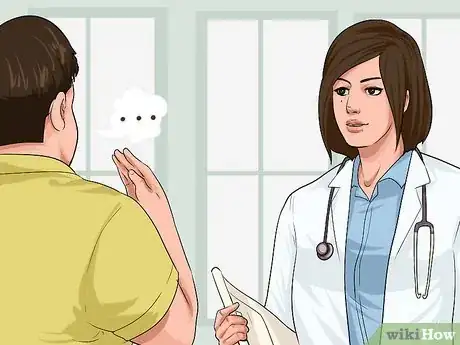




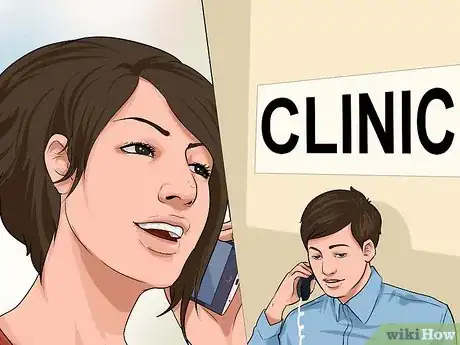
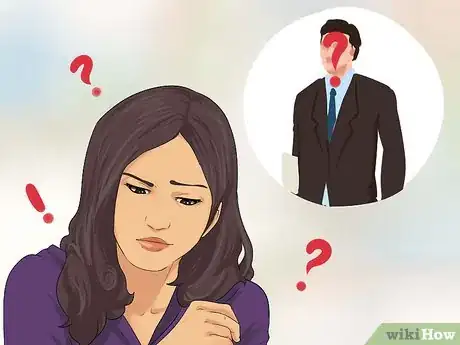



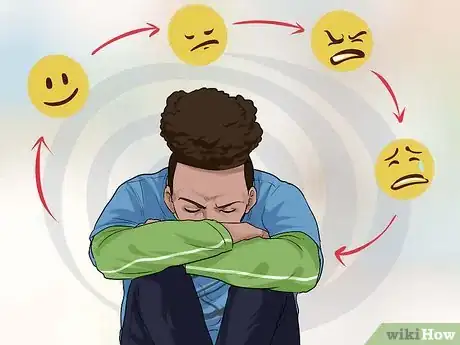
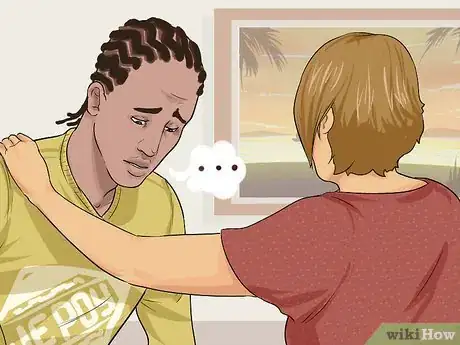



























































Medical Disclaimer
The content of this article is not intended to be a substitute for professional medical advice, examination, diagnosis, or treatment. You should always contact your doctor or other qualified healthcare professional before starting, changing, or stopping any kind of health treatment.
Read More...